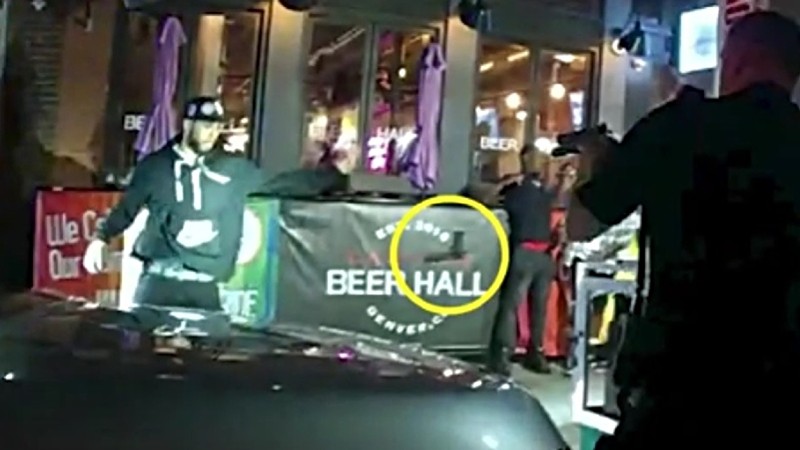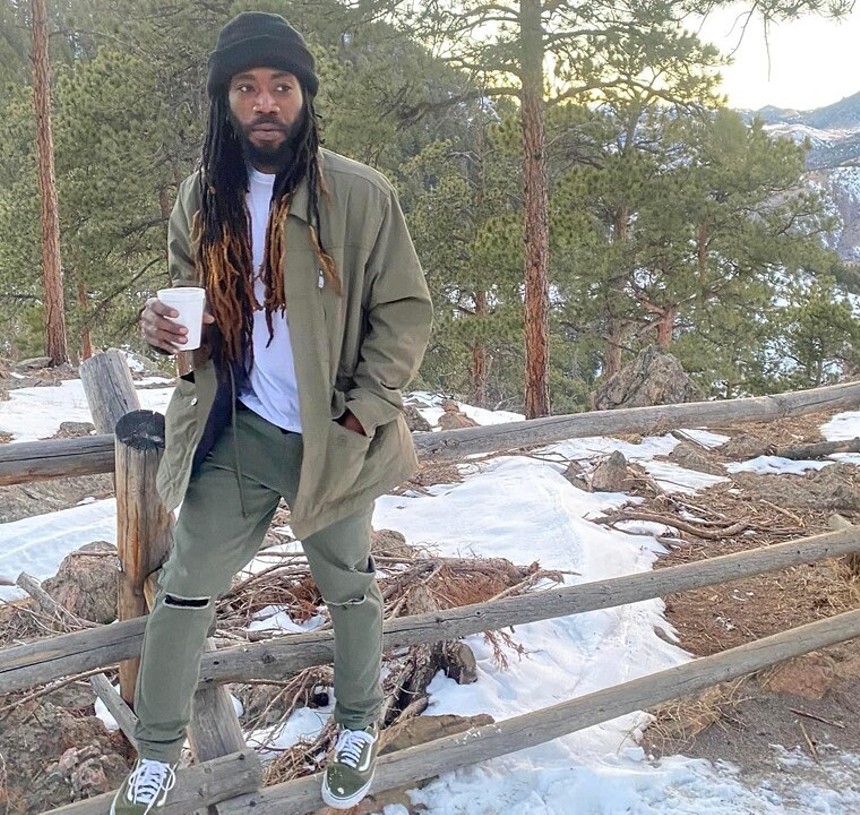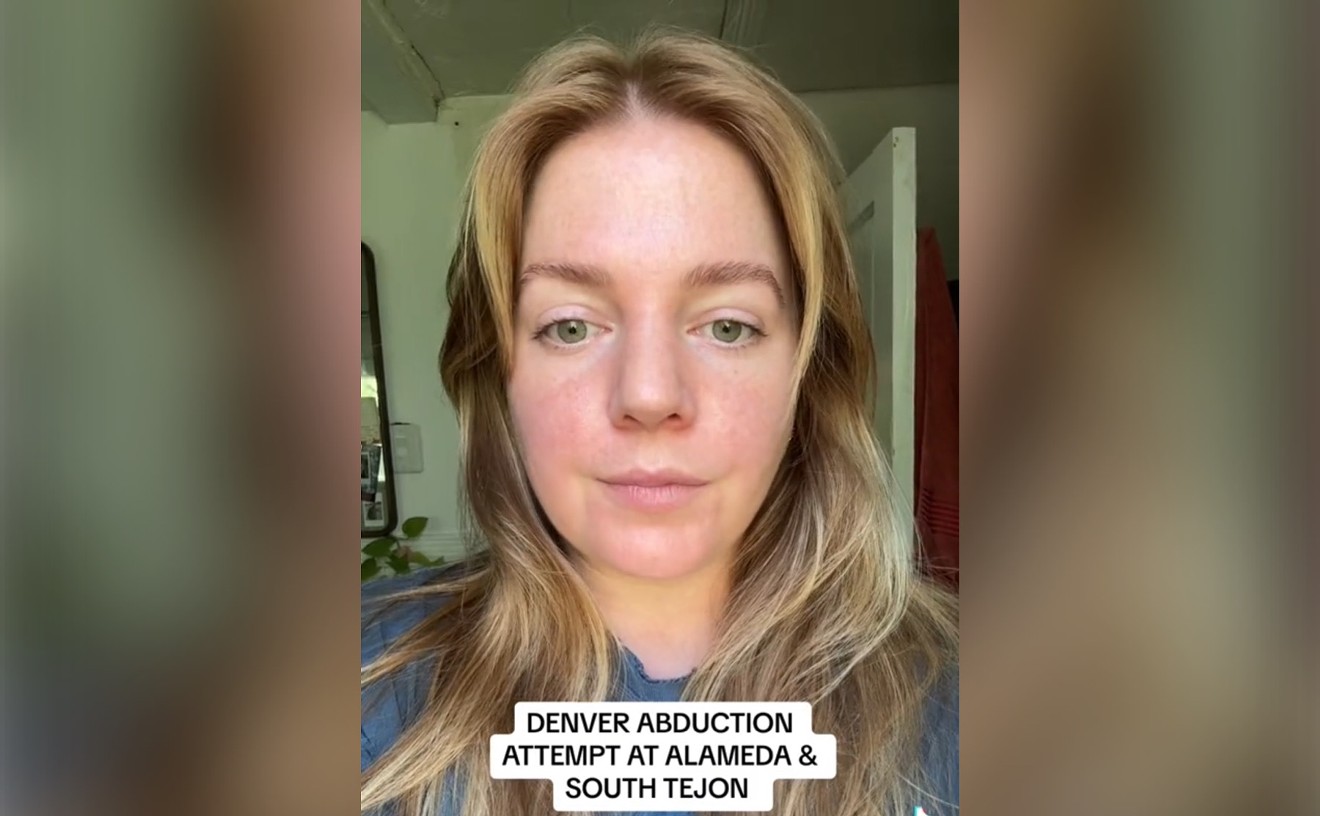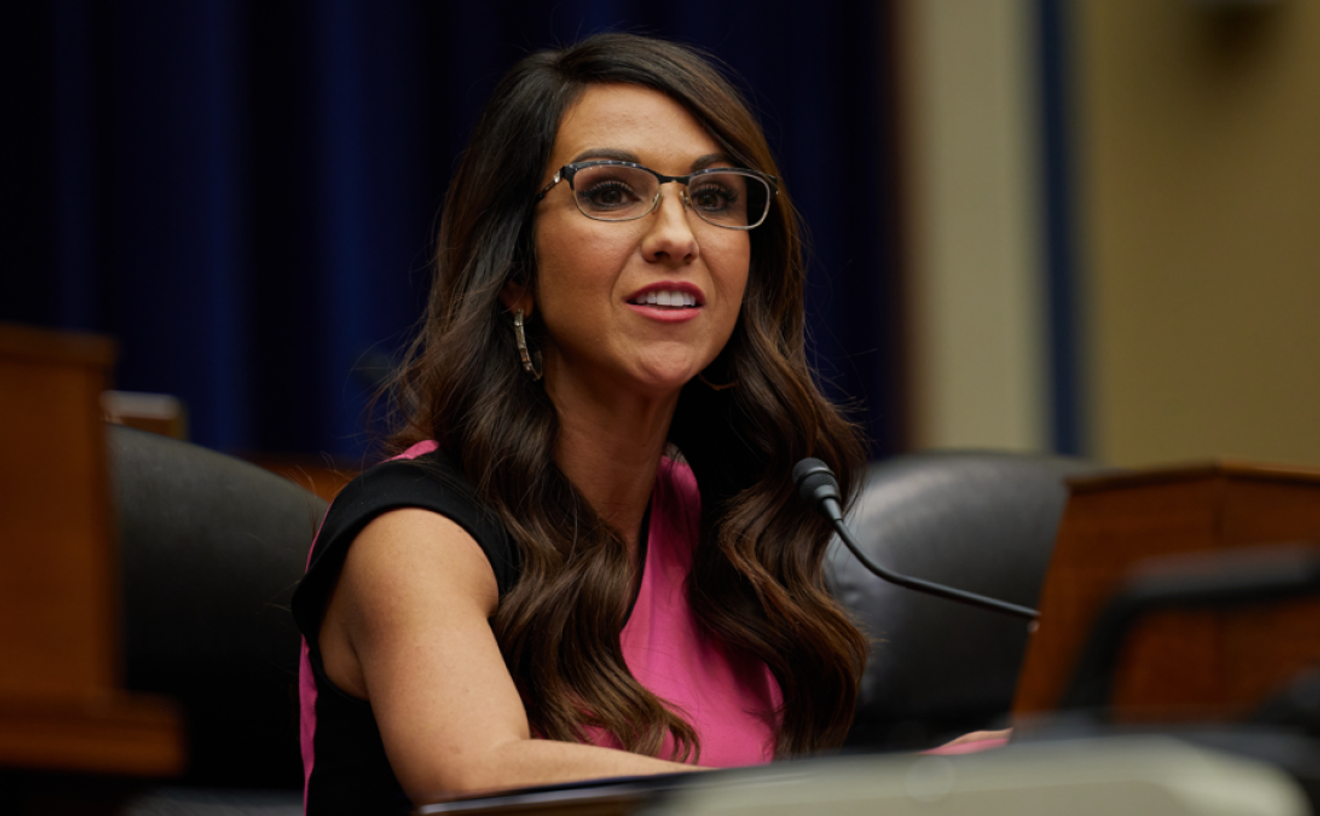Ever since Mark Bess was hit by a ricocheting Denver Police Department bullet last July, he's been haunted by nightmares that send him back to that night on Larimer Street, where he laid on the ground and watched blood trickle down the pavement.
Thirty-three-year-old Bess is in the trade-show industry; he couldn't work for months after the shooting because large crowds and unexpected loud noises took him back to those moments outside the Larimer Beer Hall.
“The police were not taking accountability for getting us help, and no one was worried about whether I was homeless or out of work or mentally okay,” Bess says. “I got a lawyer about a week after the incident because I’d just break out crying six or seven times a day and have panic attacks."
On April 25, that attorney, John Lee of Fuicelli & Lee, filed a lawsuit on Bess's behalf; the law firm of Rathod Mohamedbhai partnered on the case on behalf of fellow victims Bailey Alexander, Yekalo Weldehiwet and Willis Small IV. Angelica Rey, who was shot in the leg, had filed suit earlier; Bess didn't know her or any of the other bystanders shot that night, but it was Rey's blood he'd seen trickling down the street.
The latest lawsuit names DPD Officer Brandon Ramos as the defendant and asks for damages related to the four victims' pain and suffering during and after the shooting.
On July 17, 2022, DPD officers confronted Jordan Waddy, a 23-year-old club-goer who’d gotten into an altercation with another man on the crowded street after last call at the bars at 2 a.m. The officers suspected Waddy had a gun and ordered him to get down. He responded by throwing the gun away from his body as three officers fired their weapons, injuring Waddy and six bystanders, including Bess.
Denver District Attorney Beth McCann charged Waddy with third-degree assault and three counts of possession of a firearm by a previous offender. She also called in a grand jury to investigate whether the officers involved in the shooting should be criminally charged.
In January, the grand jury determined that officers Kenneth Rowland and Meghan Leiberman had acted legally, but Ramos was indicted on ten criminal charges, including second- and third-degree assault, negligence with a deadly weapon, prohibited use of a weapon, and reckless endangerment. The grand jury called Ramos’s conduct “reckless, unreasonable and unnecessary for the purpose of protecting himself or other officers.”
Bess, who'd been celebrating a friend’s birthday, was waiting to get food at a truck outside the Larimer Beer Hall, at 2012 Larimer Street, when he was hit by a ricocheting bullet and sustained a second-degree burn on his chest. According to the lawsuit, he and his fellow plaintiffs “will each bear the resulting scars for the remainder of their lives.”
The lawsuit contends that the shots that harmed Bess and the three others who are part of the case should never have been fired.
“Mr. Waddy grabbed the handgun from the top of its frame, rather than by its handle, clearly demonstrating his intent to dispense with the weapon, rather than aim or fire it at the officers or anyone else in the crowd,” the suit says. “Simultaneously, and despite Mr. Waddy’s obvious surrender, Officers Rowland and Lieberson opened fire on Mr. Waddy, striking him multiple times.”
That’s when Ramos fired, the lawsuit continues, calling the odds that the officer would hit bystanders “virtually certain.”
Bess remembers hearing the first gunshots, then the next. By the time he realized what was going on, his chest was burning and he fell to the ground. He was panicking and couldn’t stand back up; a friend tried to hoist him to his feet so that he could get to a safer location.
“In my mind, I'm thinking anyone but the police is shooting,” Bess recalls. “I’m trying to find out where the shots are coming from. I’m worried about an ongoing threat.”
The lawsuit notes that all of the plaintiffs live with anxiety and fear in public settings.
Bess’s panic heightens when he sees police officers. When he first tried to tell officers on the scene that he’d been shot, he says that they told him he didn’t have to be on the police report if he didn’t want to be. He didn’t know then that the police were the only ones who’d fired weapons, and says no officer ever informed him of that fact.
“That threw me for a loop of, ‘Man, am I safe here to tell them what happened? Because they obviously don’t want to get me on the report,’” Bess says. “It’s hard to process what you should do and what's going on, but it’s not hard to recognize what’s not being done right.”
Bess, who is Black, then sought out a Black DPD officer who paid attention, got his name, and took a full report of his story.
The DPD declined to comment on specifics of the situation because of pending litigation and criminal cases. Ramos is suspended without pay and is scheduled for a conference hearing May 15. Waddy is scheduled for an arraignment hearing May 19. Both hearings were rescheduled from previous dates.
The night of the shooting, Bess says, he had to sleep in his car because he’d lost his phone in the chaos and didn’t have another way to get into his building. He's from North Carolina and doesn’t have family in Denver, so he lacked a support system. He says he lost friends, too, because he went into a shell and didn’t want to be around anyone.
“If the police can’t protect me, [my friends] can’t protect me, either,” he says. Although he was given a packet with phone numbers to call for help, he sought care independently and started seeing a therapist.
“I didn’t even want to be outside,” he says. “I’m still very uneasy around any police. It’s not bars I’m afraid of. It’s police around bars I’m afraid of.”
Before the shooting, Bess says he felt that downtown Denver was pretty safe compared to downtown areas in other states.
After the incident, the DPD made changes intended to make the area safer and says it has adjusted training practices to include strategies for preventing and de-escalating situations in large crowds. "DPD has a robust plan that includes improved lighting, strategic road closures, and working with area businesses," according to the department.
Among its moves in the immediate aftermath was restricting food trucks in LoDo and the Ballpark neighborhood, claiming they contributed to the chaos. Bess doesn't buy that.
“The food truck didn’t shoot me,” he says. “To be honest, I'm glad the food truck was there, because I took cover in front of it. The only way we can change the safety is to change the police.”
Food trucks will be allowed back in the area this summer; the DPD says it is working with the Department of Transportation and Infrastructure and other city partners to determine what that will look like.
Bess wants the department to know that it has to do better. “Some professions can't afford to have a few bad people,” Bess says. “Some professions have to be perfect.”
He says he decided to go forward with the lawsuit because he wants accountability for what happened to him and the others.
“This is the only way for me and the other victims to get some justice,” he says. “I just want everybody to know that all the victims...we’re all different races, and it can happen to any of us. If we let it happen this time, who's to say they won’t keep doing it?”
[
{
"name": "Air - MediumRectangle - Inline Content - Mobile Display Size",
"component": "12017618",
"insertPoint": "2",
"requiredCountToDisplay": "2",
"watchElement": ".fdn-content-body",
"astAdList": [
{
"adType": "rectangle",
"displayTargets": "mobile"
}
]
},{
"name": "Editor Picks",
"component": "17242653",
"insertPoint": "4",
"requiredCountToDisplay": "1",
"watchElement": ".fdn-content-body",
"astAdList": [
{
"adType": "rectangle",
"displayTargets": "desktop|tablet"
},{
"adType": "rectangle",
"displayTargets": "desktop|tablet|mobile"
}
]
},{
"name": "Inline Links",
"component": "18838239",
"insertPoint": "8th",
"startingPoint": 8,
"requiredCountToDisplay": "7",
"maxInsertions": 25
},{
"name": "Air - MediumRectangle - Combo - Inline Content",
"component": "17261320",
"insertPoint": "8th",
"startingPoint": 8,
"requiredCountToDisplay": "7",
"maxInsertions": 25,
"watchElement": ".fdn-content-body",
"astAdList": [
{
"adType": "rectangle",
"displayTargets": "desktop|tablet"
},{
"adType": "rectangle",
"displayTargets": "desktop|tablet|mobile"
}
]
},{
"name": "Inline Links",
"component": "18838239",
"insertPoint": "8th",
"startingPoint": 12,
"requiredCountToDisplay": "11",
"maxInsertions": 25
},{
"name": "Air - Leaderboard Tower - Combo - Inline Content",
"component": "17261321",
"insertPoint": "8th",
"startingPoint": 12,
"requiredCountToDisplay": "11",
"maxInsertions": 25,
"watchElement": ".fdn-content-body",
"astAdList": [
{
"adType": "leaderboardInlineContent",
"displayTargets": "desktop|tablet"
},{
"adType": "tower",
"displayTargets": "mobile"
}
]
}
]












